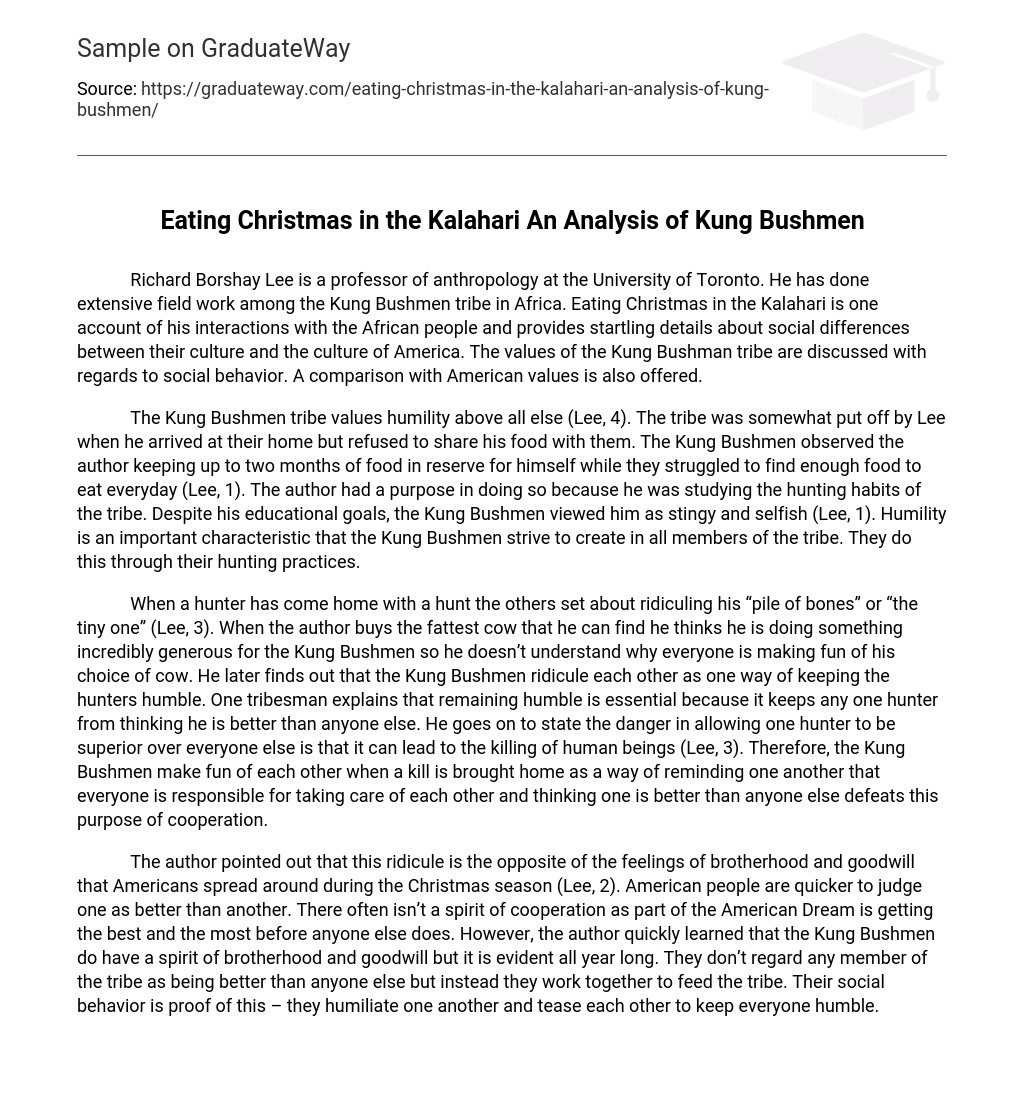Richard Borshay Lee is a professor of anthropology at the University of Toronto. He has done extensive field work among the Kung Bushmen tribe in Africa. Eating Christmas in the Kalahari is one account of his interactions with the African people and provides startling details about social differences between their culture and the culture of America. The values of the Kung Bushman tribe are discussed with regards to social behavior. A comparison with American values is also offered.
The Kung Bushmen tribe values humility above all else (Lee, 4). The tribe was somewhat put off by Lee when he arrived at their home but refused to share his food with them. The Kung Bushmen observed the author keeping up to two months of food in reserve for himself while they struggled to find enough food to eat everyday (Lee, 1). The author had a purpose in doing so because he was studying the hunting habits of the tribe. Despite his educational goals, the Kung Bushmen viewed him as stingy and selfish (Lee, 1). Humility is an important characteristic that the Kung Bushmen strive to create in all members of the tribe. They do this through their hunting practices.
When a hunter has come home with a hunt the others set about ridiculing his “pile of bones” or “the tiny one” (Lee, 3). When the author buys the fattest cow that he can find he thinks he is doing something incredibly generous for the Kung Bushmen so he doesn’t understand why everyone is making fun of his choice of cow. He later finds out that the Kung Bushmen ridicule each other as one way of keeping the hunters humble. One tribesman explains that remaining humble is essential because it keeps any one hunter from thinking he is better than anyone else. He goes on to state the danger in allowing one hunter to be superior over everyone else is that it can lead to the killing of human beings (Lee, 3). Therefore, the Kung Bushmen make fun of each other when a kill is brought home as a way of reminding one another that everyone is responsible for taking care of each other and thinking one is better than anyone else defeats this purpose of cooperation.
The author pointed out that this ridicule is the opposite of the feelings of brotherhood and goodwill that Americans spread around during the Christmas season (Lee, 2). American people are quicker to judge one as better than another. There often isn’t a spirit of cooperation as part of the American Dream is getting the best and the most before anyone else does. However, the author quickly learned that the Kung Bushmen do have a spirit of brotherhood and goodwill but it is evident all year long. They don’t regard any member of the tribe as being better than anyone else but instead they work together to feed the tribe. Their social behavior is proof of this – they humiliate one another and tease each other to keep everyone humble.
The author goes on to state that perhaps this very attitude is what enables the Kung Bushmen tribe to continue to prosper in a harsh environment. Their generosity in sharing their kills with the entire tribe allows everyone to eat. However, one person isn’t always responsible for the hunt. Everyone takes turns being the hero of the day and bringing home enough food for everyone. The teasing shows everyone that each member of the tribe is valuable since all contribute on different occasions. This is in contrast to the American value of only looking out for oneself. Americans don’t too often see others buying enough food at the grocery store to share with the entire neighborhood. Instead, Americans tend to look out for number one and the ones that do the best job of this are seen as having more power. This isn’t so in the Kung Bushmen tribe. It is rather refreshing to know that a group of people can coexist with one another without constantly competing to be the best. Instead, the Kung Bushmen tribe realize that every member is valuable and they should work together for the good of the entire tribe instead of only worrying about their own individual interests.
Lee, Richard Borshay. “Eating Christmas in the Kalahari.” Natural History 1969. 6 Nov 2008
<http://www.wcc.hawaii.edu/facstaff/dagrossa-p/articles/EatingChristmas.pdf>.





